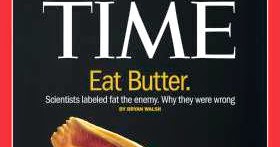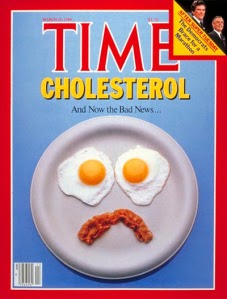I’m sure, by now, many of you have seen the
recent time magazine cover telling us to “Eat Butter”. In case you missed it,
here it is:
and say “Haha! I told you so!”, while I do a little Irish jig, because, well, I
did tell you so a couple of years ago in this post. However, I’m not going to
do that. Oh wait, did I just do it? Oops!
What I actually want to do in this post is cover off the key points from the Time article and see how we can
apply this and that perhaps we do not need to eat MORE butter. Yes, I am going
to play the Devil’s advocate!
OK, let’s dive in. Here are the salient
point from the article:
- In the 1980’s, dodgy science reported that
high intakes of saturated fat increased your risk of heart disease. The USDA
took note, created dietary guidelines that recommended avoiding fat, and
subsequently a whole realm of low fat foods were produced - Fat intake decreased, junky grain-based
carb consumption increased, the prevalence of chronic disease (heart disease,
diabetes, obesity) was on the rise - In the mid-1990s, Dr Walter Willet found
that if people replaced foods high in saturated fat with carbohydrates, there
was no reduction in heart disease. Go figure! More people then started to
question the role of fat - The Mediterranean Diet began to take flight
as the heart-healthy diet, with its preponderance of poly and monounsaturated
fats (note – these were from nuts, seeds, fish, olives and olive oil NOT
refined vegetable/seed oils) - Arrogant wanker quote of the year** from Dr
Robert Eckel, past president of the American Heart Association (AHA) – “When
you replace saturated fats with polyunsaturated
and monounsaturated fats, you lower cholesterol. That’s all I need to know”.
This kind of closed-minded, egotistical view is what is stifling the health of
the world. We need to put our egos aside and be open to new evidence and
admitting when we were wrong. This is the nature of science! - A 2010 meta-analysis (a study of many relevant
studies) found that there was no significant evidence of an association between
saturated fat and increased risk of heart disease. These findings were further
supported by another study this year - Saturated fat increase LDL cholesterol AND
HDL cholesterol, which negates the heart disease risk - Refined carbs stimulate the production of
insulin, which drives fat storage - Low-carb diets have shown potential in
helping with diabetes and obesity - Increasing meat may have environmental
consequences. Read why I disagree HERE (the Allan Savory vid) - Some experts are concerned that if we
spread the message that saturated fat is fine, this may increase unhealthy
habits and instead, we should focus on whole, real foods
Now for my thoughts on the situation.
First off, I think it is awesome, and long
overdue, that this information is out in mainstream media. And it is only
fitting that Time Magazine publish this, considering they were the catalyst for
everyone freaking out in the first place with this cover in 1984:
I whole-heartedly agree that we should not
avoid saturated fat. The research clearly does not support the thinking that
this nutrient increases the risk of heart disease. HOWEVER I think there are a
few things we need to be wary of
1. Healthy, “risk-free” saturated
fat does not mean party pies, sausage rolls and pop-tarts.
Saturated fat from REAL FOOD is what we
are talking about here, peeps, so do not use this research as a license to go
and feast at McDonald’s or your local 7/11! Instead, enjoy real-food sources of
saturated fat, such as:
- Meat and organs (choose grass-fed, which is
also a great source of omega-3 fatty acids) - Chicken (again, free range and organic is
best) - Egg yolks
- Fish (31% of the fatty acids in salmon are
saturated) - Olives (YES they are actually 13% saturated
fat!) - Nuts (macadamias are highest in saturated
fat of all nuts) - Coconut and coconut products (the main
fatty acid, lauric acid, has been shown to increase HDL/”good” cholesterol, and
is also the predominant fatty acid in breast milk) - Dairy products
- Avocado (23.5% of fats are saturated)
Note that those foods that we often
associate with being good sources of poly- or mono-unsaturated fats (e.g.
salmon, nuts, avocado, olives) are actually also good sources of saturated fat?
That is because these fatty acids never exist in isolation! We need to start
thinking of WHOLE foods, rather than their individual constituents.
2. Carbohydrates are not the devil
 |
| Image by Fonda LaShay, via pinterest |
When the original research came out
regarding fat causing heart disease and making us fat, we all went gung-ho and
took the stance of “the less fat we can have in our diet, the better”. We know this is not true. We need fats for
the optimal functioning of a number of bodily processes, such as hormone
production, health bone metabolism, cell membrane integrity, satiety, immune
health and more.
What concerns me is that people will take
the “low-fat=no-fat” attitude and apply it to carbohydrates, going extremely
low carb, or cutting them out altogether. While this may be beneficial for some
(such as those suffering from epilepsy, pre-diabetes or un-medicated diabetes, or even obesity),
this does not mean it is the best choice for everyone. I made the mistake of
going too low-carb for too long. Learn from my mistakes and be mindful that you
need carbs for a few things:
- Carbohydrates feed the good bacteria in our
digestive system. If we go too low carb, they can be starved, creating
dysbiosis and digestive problems - Carbohydrates provide bulk to the stool to
help with passing a bowel motion, and we are all aiming for the perfect poop,
right? - Carbohydrates help with the conversion of
the inactive (T4) to the active (T3) form of thyroid hormone, thus helping fuel
metabolism. Go too low carb and you may find yourself in a bit of a weight
pickle as your thyroid stops working as it should - Carbohydrates prevent the body from relying
on the adrenal glands and cortisol to keep blood sugar levels in balance,
thereby limiting the likelihood of adrenal fatigue - Carbohydrates help to refuel muscle
glycogen stores after an intense workout, and prevent the breakdown if muscle
There are more, but I think you get the
point. Carbs can be useful. How much you need is dependent on your lifestyle
and individual situation. If you are active and/or stressed, you may need
slightly more. If you are sedentary and/or chilled out, maybe a little less
will suit. Play around with it and see how you feel!
All in all, I recommend that you avoid
low-fat junky “foods” and not fear fat, while also being mindful that some
carbohydrate-rich foods (such as sweet potato, potato, parsnip, beetroot, rice,
a little fruit and even quinoa or legumes, if tolerated) are also great sources of vitamins, minerals
and antioxidants, and can help our body to function at its peak. Do I think
they should be the bulk of our diet? No. But they should not be demonised,
either.
Moral to the story – eat real food. If it
needs an ingredients label, or if you don’t know what all of the ingredients
are, don’t eat it. Simple. Don’t get caught up in the minutia – life is too short!
What are your thoughts on this whole
dealio?



